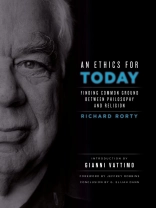Richard Rorty is famous, maybe even infamous, for his philosophical nonchalance. His groundbreaking work not only rejects all theories of truth but also dismisses modern epistemology and its preoccupation with knowledge and representation. At the same time, the celebrated pragmatist believed there could be no universally valid answers to moral questions, which led him to a complex view of religion rarely expressed in his writings.
In this posthumous publication, Rorty, a strict secularist, finds in the pragmatic thought of John Dewey, John Stuart Mill, William James, and George Santayana, among others, a political imagination shared by religious traditions. His intent is not to promote belief over nonbelief or to blur the distinction between religious and public domains. Rorty seeks only to locate patterns of similarity and difference so an ethics of decency and a politics of solidarity can rise. He particularly responds to Pope Benedict XVI and his campaign against the relativist vision. Whether holding theologians, metaphysicians, or political ideologues to account, Rorty remains steadfast in his opposition to absolute uniformity and its exploitation of political strength.
Table des matières
Foreword: Richard Rorty: A Philosophical Guide to Talking About Religion, by Jeffrey W. Robbins
Introduction, by Gianni Vattimo
An Ethics for Today, by Richard Rorty
Conclusion: Philosophy, Religion, and Religious Belief After Rorty, by G. Elijah Dann
A propos de l’auteur
Richard Rorty (1931-2007) was professor of comparative literature and philosophy at Stanford University. His Columbia University Press books are The Future of Religion (with Gianni Vattimo) and What’s the Use of Truth?Gianni Vattimo is emeritus professor of philosophy at the University of Turin and a member of the European Parliament. His books include The Responsibility of the Philosopher; Christianity, Truth, and Weakening Faith: A Dialogue (with René Girard); Nihilism and Emancipation: Ethics, Politics, and Law; and After Christianity.







![Couverture du Brian Schrag & Julisa Rowe: Community Arts for God's Purposes [Chinese] 貼近神心意的社群藝術 Couverture du Brian Schrag & Julisa Rowe: Community Arts for God's Purposes [Chinese] 貼近神心意的社群藝術](https://static.worldofdigitals.com/thumb_webp/740/9781645083740.webp)




